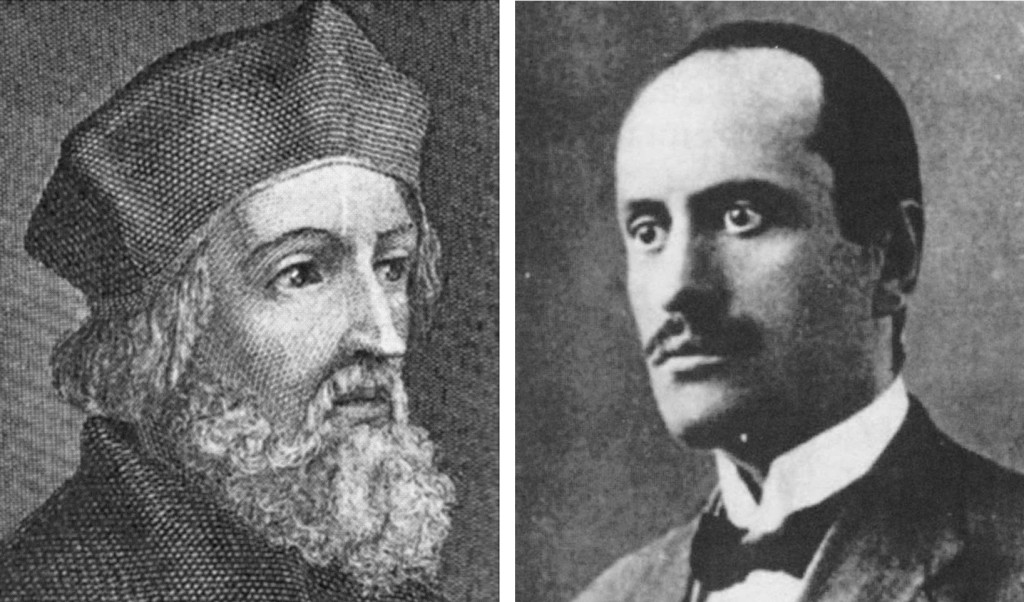“Giovanni Hus the veridico”, a work dedicated to the Czech reformist by the future Duce and recently brought to the fore by prof. Pavel Helan
Among the various examples and types of relationships between Italy and the Czech Republic since the Medieval period, what we have today, thanks to the work of Pavel Helan, professor of History at the Husita Faculty of Theology at the Prague Charles IV University – with the title Duce a kacíř. Literární mládí Benita Mussoliniho a jeho kniha Jan Hus, muž pravdy (L. Marek, Brno 2006) “The literary activity of the young Benito Mussolini and his book Giovanni Huss, il veridico” – is indeed a striking and singular testimony.
The protagonists of this curious “correlation” between the two countries are two well known characters: Benito Amilcare Andrea Mussolini and Jan Hus. The first was one of the major figures of Italian political and social history during the first half of the 20th century; the second, instead, was a Bohemian religious reformer and theologian who profoundly affected the history of Cechia in the 15th century
Now, although these two personalities and their historical events are known to most people, in the Peninsula as well as in Bohemia, almost nobody is aware of the fact that, at a young age, the future Duce of Fascism actually dedicated a written work to the Bohemian reformer with the title of Giovanni Hus. Il veridico, published in 1913 by the Rome publisher Podreca and Galantara.

In that period, Mussolini, as a militant of the Socialist Party and passionate political journalist, was pervaded by a profound anti-clerical sentiment, which he did not hesitate to manifest in all of his writings.
Jan Hus offered him the “ideal model to draw on for inspiration, to give free rein to his anti-clerical ideas, denouncing the widespread corruption inside the Roman Church, during the medieval period, as well as during his own period”. The same pseudonym which the author utilized to sign his articles -: “true heretic” – highlights the esteem which he felt towards the Bohemian. “The occasion for writing the book was given to Mussolini by the Free thinking International Conference which was to take place in Prague in 1915 to commemorate the 500th anniversary of the death of Hus”. In preparation for the event, the young Benito “maintained close contacts with František Loskot, one of the representatives of the Czech division of the Free Thinking International Organization, which probably offered him the opportunity to prepare the booklet devoted to Hus.
The work by Mussolini, as Helan points out, even if it is not endowed with great literary power, is useful for understanding the Duce’s way of thinking : Jan Hus, in fact, “is not only used to throw light onto the perversion of the ecclesiastic authorities”, but constitutes an ideal model of a leader from whom to draw inspiration, as he is able, thanks to his strong social instinct and profound trust in an ideal , to take a hold over the masses of people , guiding and defending them from divisions, which would only weaken the radical movement”: in a few words, the leader par excellence.
The book Giovanni Hus il veridico, that was withdrawn on Mussolini’s orders in view of the Lateran Pacts, was successful in America, where it was re-printed on two occasions (in 1929 and 1939), and in Italy in 1948 and 1988, whilst in the Czech Republic it never enjoyed great fame. Therefore, it is due to prof. Helan that the first full translation of the book by Benito Mussolini was accomplished and diffused on Czech land.
After due consideration, the premise made by the future Duce at the end of his writing sounds paradoxical: “by giving this booklet to the press, I express the hope that it will evoke, in the minds of its readers, hatred for any form of spiritual and profane tyranny, whether theocratic or Jacobin ”.
By federico Gambacorta




